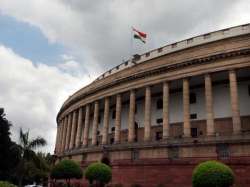Lok Sabha passes Bill for adjudication of river water rows
Moving the Inter-State River Water Disputes (Amendment) Bill, 2019, Jal Shakti Minister Gajendra Singh Shekhawat said the draft legislation proposed to introduce a mechanism to resolve the water disputes amicably by negotiations through a Disputes Resolution Committee (DRC).

A Bill to streamline the adjudication of inter-state river water disputes and make the present legal and institutional architecture robust was on Wednesday passed in the Lok Sabha by voice vote.
Moving the Inter-State River Water Disputes (Amendment) Bill, 2019, Jal Shakti Minister Gajendra Singh Shekhawat said the draft legislation proposed to introduce a mechanism to resolve the water disputes amicably by negotiations through a Disputes Resolution Committee (DRC).
He said the DRC would be established by the Centre consisting of experts from relevant fields before the water dispute was referred to the Tribunal.
In his concluding remarks, the Minister said as only 4 per cent water can be replenished to meet the demand, it was a very important issue and this was the need of the time to think about water management because of the increasing danger of climate change.
"We should think on both demand as well as supply, otherwise a time will come when we will have to work on this issue with compulsion."
The Minister said the Bill seeks amendment to the Inter-State River Water Disputes Act, 1956 considering the increase in demand for water by the states and that inter-state river water disputes were on the rise.
Over 20 members from treasury benches and opposition raised their concerns about the Bill and proposed suggestions.
BJP's Varun Gandhi said the country would be a loser if one looked at water from a territorial perspective and stressed on the need to look water from a national perspective.
"We need a political solution rather than a legal one to end the inter-water river dispute... I walked across the Cauvery with academics, and what I found was deeply distressing," he said.
"More than 50 per cent of marginal farmers have given up agriculture. The districts in the Cauvery delta had the lowest agricultural growth."
Opposing the Bill, CPI-M's Majeed Ariff said he smelt "political motivation" behind the introduction of the Bill and noted that implementing mechanism was silent on the proposed draft legislation.
H. Vasanthakumar of Congress mentioned that southern states had the most inter-state river water disputes.
Demanding a National Water Policy, TRS member Nama Nageswara Rao said he supported the Bill but mentioned that it was not "complete" to resolve the water disputes.
Pointing out that a total of 70,000 TMC (2,000 Million Cubic) water was going into sea while the irrigation requirement of the whole country was 40,000 TMC and 10,000 TMC was needed for drinking and industries, the MP said a proper policy would solve the problem.
Midhun Reddy of YSR Congress said river water disputes should be solved within six months and voiced support to the Bill.
Mahabali Singh of JD-U said that reservoirs should be built and maintained well and mentioned that if states don't listen to tribunals, there was no point in this Bill.
BJD's Bhartruhari Mahtab said he had opposed the introduction of the Bill because states were not consulted but now he supported it.
"This Bill holds promise for tightening and improving adjudication. But some practical questions remain unaddressed. How does the Bill propose to address the challenge of implementing the Tribunals Award. Cauvery Water Tribunal award given in 2007 is yet to be implemented," he said.
The Bill seeks to provide for a single standing Tribunal (with multiple benches) instead of multiple Tribunals, which shall consist of a Chairperson, a Vice-Chairperson and not more than six members (three judicial and three experts).
The term of office of the Chairperson and Vice-Chairperson shall be five years or till they attain the age of 70 years, whichever is earlier.
It is proposed that the assessors, who provide technical support to the Tribunal, shall be appointed from amongst experts serving in the Central Water Engineering Service not below the rank of Chief Engineer.
The total time period for adjudication of a water dispute has been fixed at a maximum of four and a half years. The decision of the Bench of the Tribunal shall be final and binding on the states concerned.
It also seeks to provide for out of court settlement of disputes.